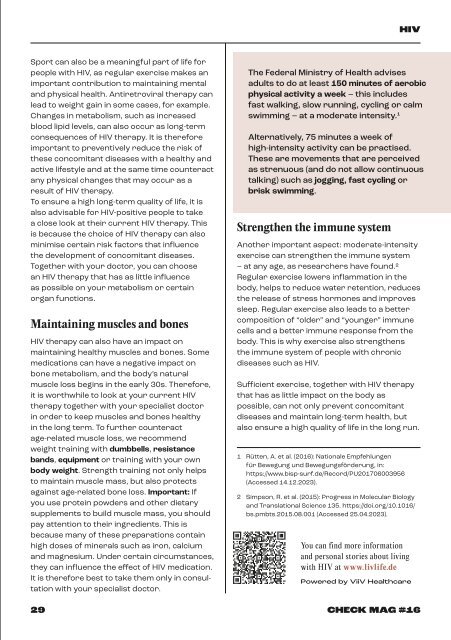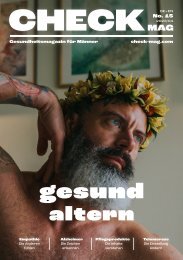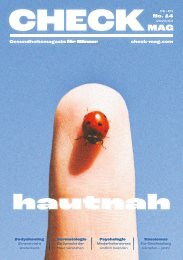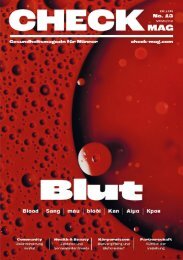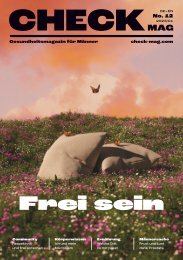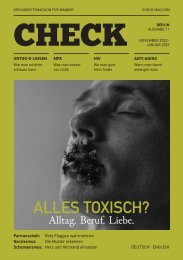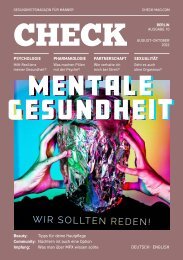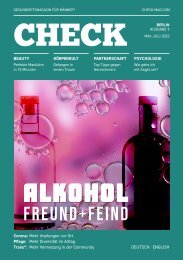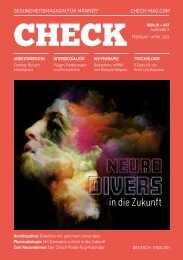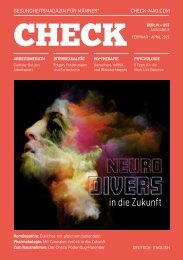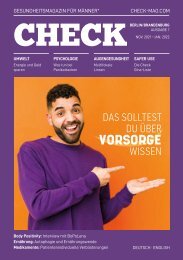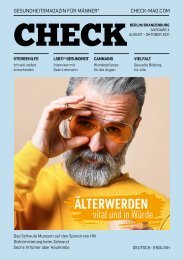CHECK Magazin - Gesundheitsmagazin für Männer No.16
Wie will ich oder wie wollen wir ohne Druck der Gesellschaft und auch der queeren Community authentisch leben, sodass es uns glücklich macht? In dieser Ausgabe schauen wir auch da hin: Auf die Kraft der Selbstwirksamkeit, auf Reformen und neue Wege der Vernetzung. Gesundheit ist ein Menschenrecht und unsere Rechte lassen wir uns nicht nehmen.
Wie will ich oder wie wollen wir ohne Druck der Gesellschaft und auch der queeren Community authentisch leben, sodass es uns glücklich macht? In dieser Ausgabe schauen wir auch da hin: Auf die Kraft der Selbstwirksamkeit, auf Reformen und neue Wege der Vernetzung. Gesundheit ist ein Menschenrecht und unsere Rechte lassen wir uns nicht nehmen.
Erfolgreiche ePaper selbst erstellen
Machen Sie aus Ihren PDF Publikationen ein blätterbares Flipbook mit unserer einzigartigen Google optimierten e-Paper Software.
HIV<br />
Sport can also be a meaningful part of life for<br />
people with HIV, as regular exercise makes an<br />
important contribution to maintaining mental<br />
and physical health. Antiretroviral therapy can<br />
lead to weight gain in some cases, for example.<br />
Changes in metabolism, such as increased<br />
blood lipid levels, can also occur as long-term<br />
consequences of HIV therapy. It is therefore<br />
important to preventively reduce the risk of<br />
these concomitant diseases with a healthy and<br />
active lifestyle and at the same time counteract<br />
any physical changes that may occur as a<br />
result of HIV therapy.<br />
To ensure a high long-term quality of life, it is<br />
also advisable for HIV-positive people to take<br />
a close look at their current HIV therapy. This<br />
is because the choice of HIV therapy can also<br />
minimise certain risk factors that influence<br />
the development of concomitant diseases.<br />
Together with your doctor, you can choose<br />
an HIV therapy that has as little influence<br />
as possible on your metabolism or certain<br />
organ functions.<br />
Maintaining muscles and bones<br />
HIV therapy can also have an impact on<br />
maintaining healthy muscles and bones. Some<br />
medications can have a negative impact on<br />
bone metabolism, and the body’s natural<br />
muscle loss begins in the early 30s. Therefore,<br />
it is worthwhile to look at your current HIV<br />
therapy together with your specialist doctor<br />
in order to keep muscles and bones healthy<br />
in the long term. To further counteract<br />
age-related muscle loss, we recommend<br />
weight training with dumbbells, resistance<br />
bands, equipment or training with your own<br />
body weight. Strength training not only helps<br />
to maintain muscle mass, but also protects<br />
against age-related bone loss. Important: If<br />
you use protein powders and other dietary<br />
supplements to build muscle mass, you should<br />
pay attention to their ingredients. This is<br />
because many of these preparations contain<br />
high doses of minerals such as iron, calcium<br />
and magnesium. Under certain circumstances,<br />
they can influence the effect of HIV medication.<br />
It is therefore best to take them only in consultation<br />
with your specialist doctor.<br />
The Federal Ministry of Health advises<br />
adults to do at least 150 minutes of aerobic<br />
physical activity a week – this includes<br />
fast walking, slow running, cycling or calm<br />
swimming – at a moderate intensity. 1<br />
Alternatively, 75 minutes a week of<br />
high- intensity activity can be practised.<br />
These are movements that are perceived<br />
as strenuous (and do not allow continuous<br />
talking) such as jogging, fast cycling or<br />
brisk swimming.<br />
Strengthen the immune system<br />
Another important aspect: moderate-intensity<br />
exercise can strengthen the immune system<br />
– at any age, as researchers have found.2<br />
Regular exercise lowers inflammation in the<br />
body, helps to reduce water retention, reduces<br />
the release of stress hormones and improves<br />
sleep. Regular exercise also leads to a better<br />
composition of “older” and “younger” immune<br />
cells and a better immune response from the<br />
body. This is why exercise also strengthens<br />
the immune system of people with chronic<br />
diseases such as HIV.<br />
Sufficient exercise, together with HIV therapy<br />
that has as little impact on the body as<br />
possible, can not only prevent concomitant<br />
diseases and maintain long-term health, but<br />
also ensure a high quality of life in the long run.<br />
1 Rütten, A. et al. (2016): Nationale Empfehlungen<br />
<strong>für</strong> Bewegung und Bewegungsförderung, in:<br />
https://www.bisp-surf.de/Record/PU201706003956<br />
(Accessed 14.12.2023).<br />
2 Simpson, R. et al. (2015): Progress in Molecular Biology<br />
and Translational Science 135. https://doi.org/10.1016/<br />
bs.pmbts.2015.08.001 (Accessed 25.04.2023).<br />
You can find more information<br />
and personal stories about living<br />
with HIV at www.livlife.de<br />
Powered by ViiV Healthcare<br />
29 <strong>CHECK</strong> MAG #16


